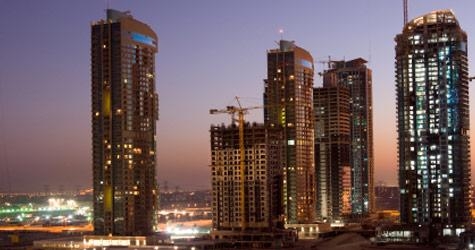Qatar is in talks to buy some or all of Milan's newly built Porta Nuova business district as Italy's economic crisis squeezes its U.S. developer, several sources have told Reuters.
Texas-based Hines declined comment on any move to cut its stake in the 34-acre project, planned during the last boom; no immediate comment was available from the Gulf emirate, which has made major investments in European real estate in recent years.
But three sources, one with direct knowledge of talks, spoke of discussions on selling Qatar at least part of a development that has so far cost some 1.8 billion euros ($2.4 billion) and has transformed the skyline of Italy's commercial capital with a series of towers a mile (1.5 km) north of the historic center.
A fourth property sector source said other investors had looked at Porta Nuova but that no formal sale process was under way for the estate of offices and high-end apartments, which has been likened to the larger Canary Wharf in London's docklands.
Work started in 2007, months before the global financial crunch, and office lettings and apartment sales are now behind projections as the Italian economy stagnates and lags even other European states, two sources with knowledge of the project said.
"The timing has been bad and Hines is keen to cut its exposure or get out at the right price," one of them added.
With the final stage due for completion next year, Hines has said about half the 370 apartments have been sold for an average of 1.5 million euros and 55 percent of the 130,000 square meters of offices are let – to Italian bank Unicredit.
The bank is among lenders to the project and now occupies its eponymous Unicredit Tower, Italy's tallest building.
Milan's property market reflects Italy's economy, however; data from consultant CBRE show a drop of 28 percent in the amount of office space being newly taken up in the city last year compared to five years earlier in 2007; the vacancy rate rose from 7.4 percent to 11.6 percent over the same period.
Luxury Milan home prices have fallen by about 8 percent in that time and, for all its glamour as an international hub for the fashion and design industries, the northern city of 1.4 million has not seen the non-European rich lining up to deposit their cash in its real estate in the way that London has.
As well as Italian money, investors in Porta Nuova include the U.S. teacher's pension fund TIAA-CREF. About two thirds of funding was from lenders including Commerzbank's Eurohypo and Banca Popolare di Milano.
QATARI LOGIC
Qatar's major deals in Europe include Harrod's department store in London and the British capital's new Shard, the tallest building in western Europe; an investment in Milan could make sense for firms linked to its sovereign wealth fund, notably Qatar Holding and real estate specialist Qatari Diar.
Neither unit was immediately available for comment but Qatar and Hines have worked together before. Qatari Diar invested in a $700-million project that Hines developed in Washington in 2011.
The 3.5 billion euros which Qatar spent on European real estate in the 12 months to mid-August 2012 was the equivalent of six weeks' revenue from the country's liquefied natural gas exports, according to Reuters calculations.
Porta Nuova would fit with the Gulf state's track record of investing in well-appointed office blocks. According to Thomson Reuters data, it owns about 29 percent of Songbird Estates, the majority owner of Canary Wharf Group, which controls the London financial district of the same name.
One of the sources who said projections had been missed at Porta Nuova blamed Hines's effort to charge the same rents as in the fashionable heart of Milan – about 500 euros per square meter – and compared that to Canary Wharf's typical 35-percent discount on the City of London, about five km miles away.
"The Porta Nuova offices are the highest quality in Milan but companies are reluctant to move from the historic center without an incentive," the source said. "It's like Canary Wharf charging the same rents as the City."
Reuters
16 April

























































